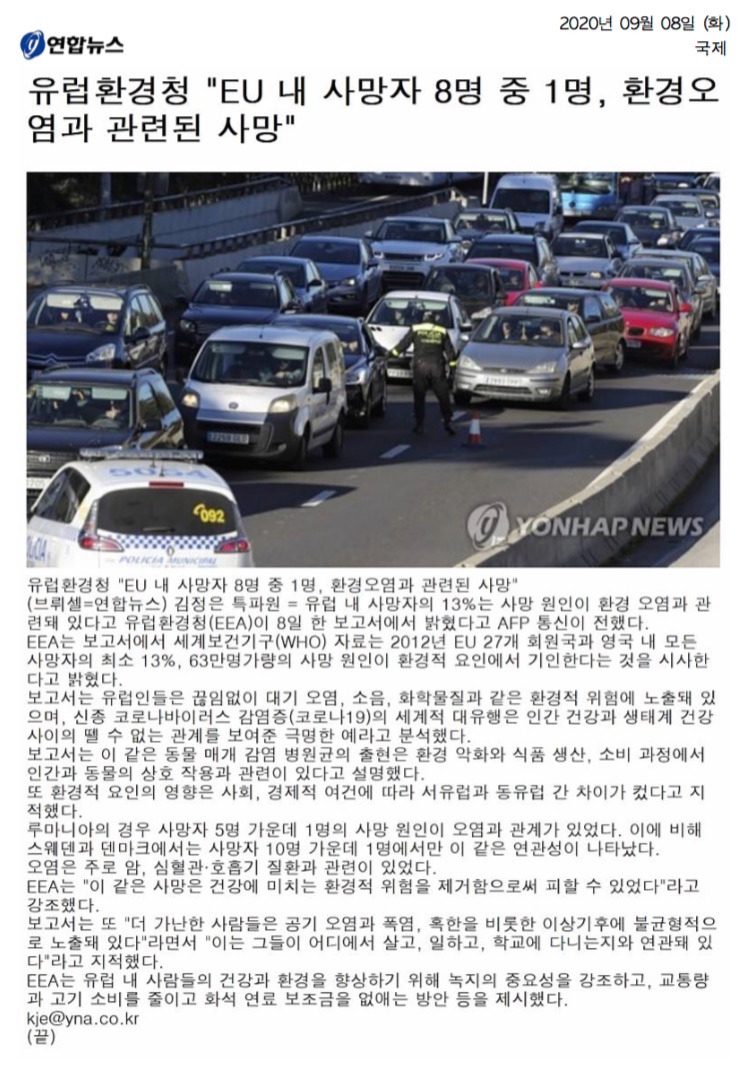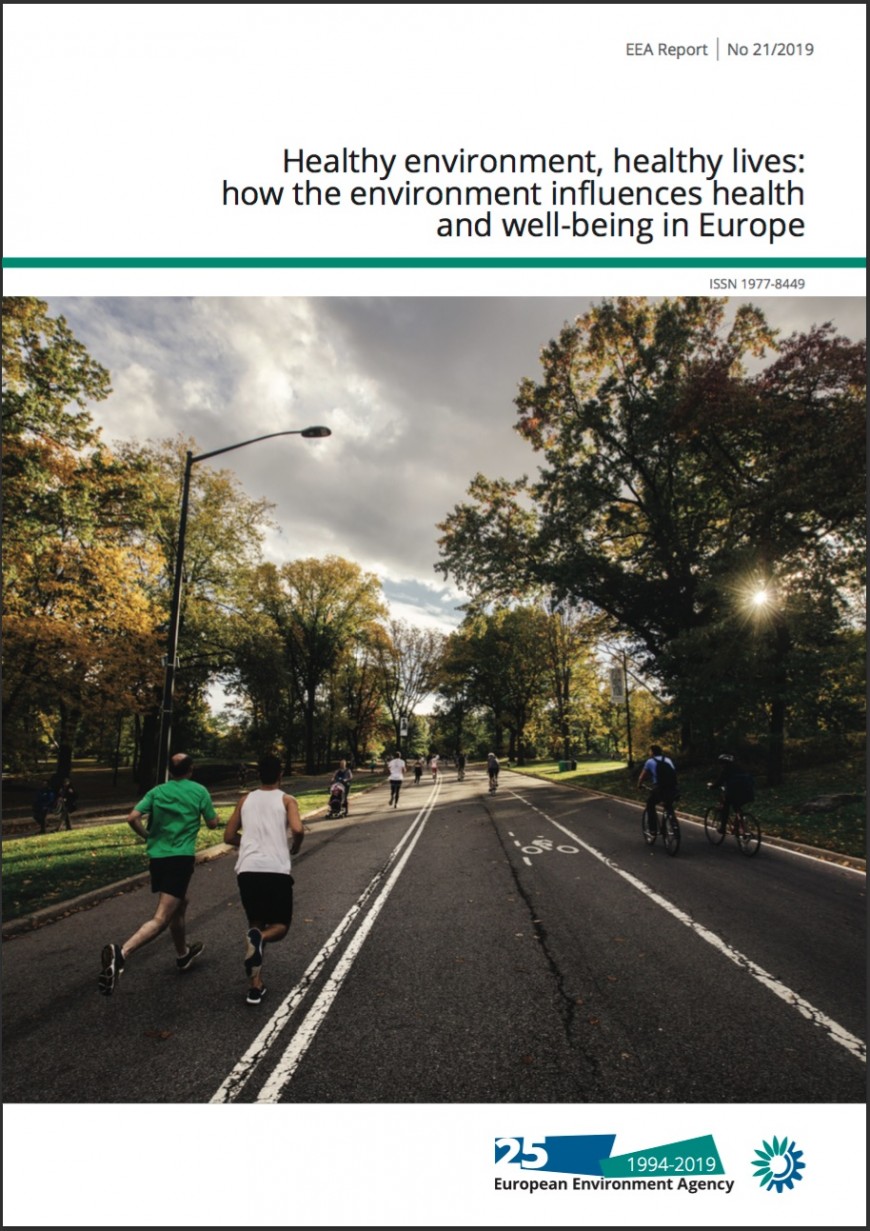유럽내 사망자 8명중 1명 환경오염과 관련된 사망
관리자
0
4862
2020.09.10 16:07
아래는 위 기사 관련된 BBC의 2020년 9월9일자 기사입니다
그리고 유럽연합의 보고서 원본은 아래 클릭해서 다운받을 수 있습니다.
EU says one in eight deaths is linked to pollution
Published
Related Topics
One in every eight deaths in Europe can be linked to pollution, according to a new report by the EU's environment agency (EEA).
It said factors such as air and noise pollution, as well as poor water quality and exposure to chemicals, contributed to 13% of all deaths.
The report also noted that poorer communities and vulnerable people were the hardest hit by pollution.
"Strong action is needed to protect the most vulnerable," the agency said.
"There is a clear link between the state of the environment and the health of our population," the EU's Environment Commissioner Virginijus Sinkevicius said.
"Everyone must understand that by taking care of our planet we are not only saving ecosystems, but also lives," he added.
What did the report find?
The report by the Copenhagen-based agency was released on Tuesday, and was described as "a major assessment on health and [the] environment" in Europe.
It found that a total of 630,000 premature deaths in the EU were attributable to environmental factors in 2012, the latest year for which data is available.
Air pollution contributed to 400,000 annual deaths, with noise pollution being an attributable factor in 12,000. The remaining deaths were linked to extreme weather such as heatwaves.
"People are exposed to multiple risks at any time, including air, water and noise pollution, and chemicals, which combine and in some cases act in unison to impact on health," the report said.
The World Health Organization (WHO) says air pollution causes the death of millions of people around the world each year and accounts for a third of fatalities from stroke, lung cancer and heart disease.
Another WHO report on noise pollution, meanwhile, noted that it contributed to heart problems by raising blood pressure and stress hormones.
The latest EEA report also explored which communities were affected.
"Poorer people are disproportionately exposed to air pollution and extreme weather, including heatwaves and extreme cold," it said.
"This is linked to where they live, work and go to school, often in socially deprived urban neighbourhoods close to heavy traffic," it added.
But there were some positives in the agency's report. It said premature deaths linked to air pollution had fallen from 1m in 1990, and also noted that water quality across most of Europe was faring well.
Which countries are hardest hit?
The EU report noted "clear differences" between Eastern and Western Europe.
"The burden of environmental disease is unevenly spread across Europe," it said. "The percentage of deaths attributable to environmental factors [ranges] from a low of 9% in Norway and Iceland to 23% in Albania and 27% in Bosnia and Herzegovina."
In the EU, the highest environmental contribution to mortality is seen in Romania at 19%. Other hard-hit countries include Montenegro, North Macedonia and Serbia.
In the UK, meanwhile, around 12% of deaths are said to be linked to environmental pollution.
"Socially deprived communities typically struggle under a triple burden of poverty, poor quality environments and ill health," the EEA report said.
"Eastern Europe and south-eastern Europe are both poorer and more polluted than the rest of Europe, with particulate matter emitted from the burning of solid fuel for residential heating and cooking," it added.
What can be done?
The EEA said "green and blue spaces" should be prioritised as they "cool cities during heatwaves, alleviate flood waters, reduce noise pollution and support urban biodiversity".
It also said road traffic should be reduced, and fossil fuel subsidies should be removed in an effort to address the problem.
The European Commission has echoed this view that a reduction in road traffic - specifically diesel-powered vehicles - would be beneficial. It has also suggested introducing measures to encourage greater use of electric cars.
Last year, London introduced a Ultra Low Emissions Zone (ULEZ) in an effort to limit emissions of pollutants from cars, vans and lorries. It involves charging drivers more to use older vehicles in certain areas.
Similar schemes are already in place around Europe. Italy has the most low emissions zones - some of them permanent, many of them seasonal. There are also about 80 in Germany, and 14 each in the Netherlands and the UK.
Meanwhile, France is offering a subsidy to encourage people to cycle more once coronavirus restrictions are lifted. Under the €20m (£17m; $21.7m) scheme, everyone will be eligible for bike repairs of up to €50 at registered mechanics.
Similarly, the Belgian capital Brussels announced the creation of 40km (25 miles) of additional cycle paths so fewer people could use public transport as restrictions are relaxed.
아래는 관련 보고서의 표지입니다.





